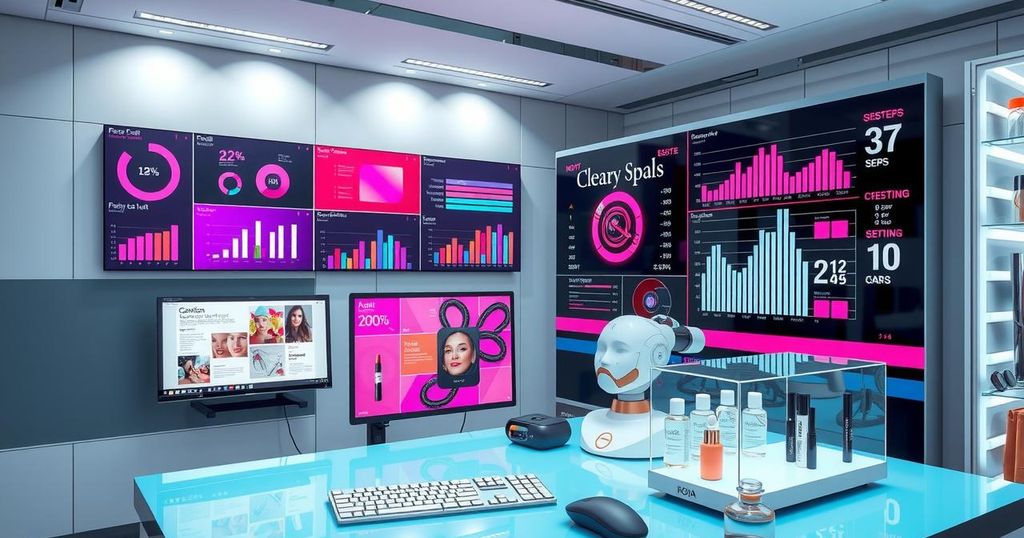Beauty Brands Blend AI Into Operations
Beauty giants like ELC, Ulta Beauty, and Coty are implementing AI strategies to adapt to changing market dynamics. They aim to optimize costs, customize communications, and enhance operational efficiencies. Despite some promising advancements, challenges including sales declines loom large, reflecting the volatile nature of the industry.
Cosmetic giants are diving deeper into artificial intelligence (AI) strategies this year, driven by changing consumer spending and the fluctuations of global trade policies. Heavyweights like The Estée Lauder Companies, Coty, and Ulta Beauty are not just experimenting with AI; they’re looking at it as a way to cut costs, personalize communications, and fine-tune inventory forecasts amidst ongoing volatility.
Roberto Canevari, ELC’s EVP and chief value chain officer, emphasized the urgency of adapting to current business needs during an analyst conference Tuesday. “How are we prepared, as you’re saying, to cope with the current business needs?” he said, expressing optimism about AI’s role. ELC, known for brands like Clinique and MAC, is using AI to tailor its marketing to regional preferences in places like India and France, promising swifter communications and decision-making processes.
AI is also proving to be a pivotal tool for determining product placement. Canevari elaborated, “The AI version that we’re working on is looking at what is happening around the world and where is better.” As their AI models mature, accuracy in product distribution is expected to improve substantially.
Under new leadership, ELC is stepping up its AI game. This past April marked a significant shift as Brian Franz was appointed as the chief technology, data, and analytics officer, the first time all technological functions have been unified under one umbrella. CEO Stéphane de La Faverie commented, “By bringing these critical areas together under one leader, we are simplifying our structure…”, which seems to signal their commitment to streamlining operations and fostering a more cohesive strategy.
Previously, under management’s direction, ELC ramped up its AI initiatives, claiming they had over 240 customized generative pre-trained transformers (GPTs) back in November to help in data analysis and vendor information synthesis. Recently, in partnership with Microsoft, they’ve developed an AI agent designed to aid employees in marketing and product development using company archives.
This push towards AI aligns with ELC’s broader initiative, dubbed Beauty Reimagined, aimed at reviving sales while enhancing agility. However, they reported a drastic sales dip in May, revealing a 10% decline to $3.6 billion in their third-quarter results for 2025.
A January report from McKinsey advised beauty brands to hone in on high-value AI applications and customizable tools to hasten impact. This includes automating sales preparations, internal training, and planning ahead.
Ulta Beauty, on the other hand, is similarly embarking on its transformation with a plan called Ulta Beauty Unleashed, which seeks to enhance core business operations and re-establish its foundational framework. During a recent Q1 2025 earnings call, CEO Kecia Steelman noted progress, stating, “Our teams are adapting…we are steadily advancing our optimization efforts.” AI and machine learning are now central to their efforts in improving supply chain efficiencies and managing schedules.
CEO Kecia Steelman, who took the reins at the start of the year, explained the Unleashed strategy in March. The plan alters how roles are defined, transforming the former Chief Technology and Information Officer into a chief technology and transformation officer to better sync up transformation and cost-cutting initiatives
Ulta’s AI integration comes on the heels of a three-year investment spurt aimed at foundational systems and data management, aimed at addressing past operational hurdles. In their Q1 2025 report, the retail giant announced a 4.5% sales increase, totaling $2.8 billion, though they remain watchful of future market conditions, according to Retail Dive.
Meanwhile, Coty is pushing through a transformation initiative launched amid the COVID-19 crisis back in 2020, aimed at ramping up margins and lowering expenses. The latest phase, announced in April, plans to cut fixed costs by around $130 million, adding to the nearly $1.2 billion saved since the initiative began. They are counting on AI to help consolidate planning functions and reduce costs across the board.
“Having this knowledge… leveraging AI in one hub… will bring significant savings in terms of costs,” Coty CEO Sue Nabi stated last November, highlighting the ongoing efforts to enhance planning efficiency. Nevertheless, Coty reported sluggish sales this quarter, attributed to market unpredictability and forex obstacles.
In conclusion, beauty brands are aggressively integrating AI technologies to navigate the turbulent market landscape. ELC, Ulta, and Coty are all pursuing various AI-driven strategies to boost operational efficiency, target marketing, and ultimately, restore sales growth. While progress is evident, there are still challenges, including declining sales and market uncertainties, making it clear that the path to AI implementation in retail beauty is one marked with both potential and growing pains.
Original Source: www.ciodive.com




